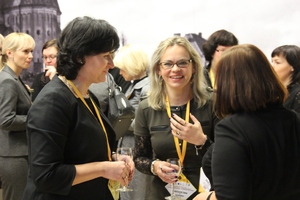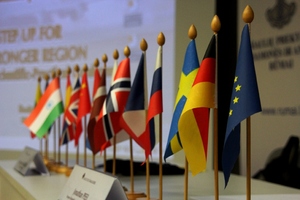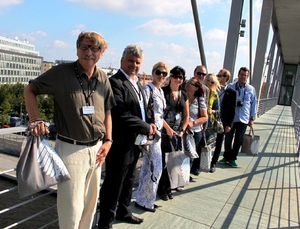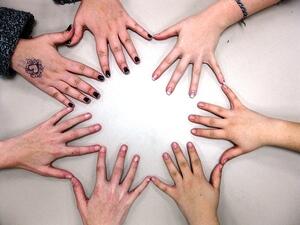I left Lithuania and my role as Innovation Circle project Lead Partner representative in 2005. It was a big decision as I enjoyed each aspect of this creative process and seeing transformation of Alytus community. At the time the city was full of live and optimism. Municipality was full of young people energy. We felt like one big happy family. It is unforgettable sense of community spirit. Even though I studied and worked in England I have always maintained my connection with Innovation Circle unique ideas and approach of working with people.
Skills, knowledge and experience gained being as a part of IC team were adaptable and transferable in any part of the world. Only today I can describe what specifically I learnt. I definitely can say, this project taught me how to be a leader in any situation in real life, be brave to do things in a different way and most importantly commitment to excellence in achieving goal. My studies of politics and development in England allowed me to even better understand the value and importance of IC projects in global development. I strongly believe that there is a great future ahead and IC network will be well known worldwide for its grassroots initiatives.
Progress and innovation has always been related to technology or infrastructure rather than social structure of the society. Its goal has always been economic but not social wellbeing of people. We were told that technology and infrastructure would reinforce economic prosperity that will trickle down into social sector. It sounds like a big lie today as it never happened.
Economic prosperity is not trickling down and does not deliver promised paradise. Economic prosperity remains locked in the hands of few creating wider and wider gaps between rich and poor. All wealth is accumulating in big global commercial centers leaving huge development disparities between them and smaller cities, towns and villages. World Economic Forum 2013 distinguished income disparities between countries as a source of conflict and one of the most serious threats to global security in the coming next ten years.

R.Sharma, world’s leadership expert noticed that the world is more wired than ever before but people have never been so disconnected. We have more technology than at any time in the history, yet we experience less humanity. It is so clear that there is something wrong in this whole economic model. Development starts resembling computer games where power narrated only to physical violence and destruction is a strategy to make profits and bring democracy. Development once had to serve people but it looks that more and more people join a circle of excluded from benefits of development. One Canadian Inuit tribe lady stated that nobody is against the progress but she questioned ignorance of local people and raping of the earth or environmental destruction and pollution left behind.
The first Indian Prime Minister Jawaharlal Neru captured the essence of the whole process saying that people displaced by dams had to make such sacrifices for the goal of the country”. How many millions of sacrifices have been made since then in the name of progress and development, just to make a small group of people to enjoy life of luxury?
The common pattern of development worldwide is that preference has been given to infrastructure and technology development but social development of people was completely ignored. Healthcare, education, social care and culture were always considered as economically wasteful as they do not produce immediate profits. Identical global policies have been implemented by most of the governments around the world. They forced cut back of these budget lines subjecting millions of people to suffering and depriving of the right to live the life their value. As Albert Einstein put it “I believe in standardizing automobiles, not human beings”. 
How many communities and livelihoods have been destroyed to meet needs of global market and ignoring local needs? I recently read about Bangladesh farmers who switched traditional farming of rice and vegetables into shrimp growing for European and the US markets. They flooded vast areas of agricultural land with sea water in hope to have good income and better life. However, nobody explained to them that prices would be regulated at a global level too and that they always remain at a mercy of the global masters. The farmers today cannot meet ends and are economically worse. They also will never be able to switch back to their traditional farming as the soil is destroyed. However, who will dare to challenge a notion that export is good for the country? We can find hundreds examples like this in tea, coffee or oil palm tree plantations.
We are becoming more and more homogenous. Take any investment package in any municipality of any country of the world and you will find a very similar text, probably once dictated by large corporations. All of them sell local people as cheap labour and open the door to exploitation of local resources without responsibility. It looks like the world lost its creativity, imagination, diversity and everyone is charmed with the fairytale of markets.
 Continuously decreasing percentage of world population can enjoy life. It is so obvious that today the riskiest thing is to do the same things in the same way hoping that somehow old behavior will present new results. Millions of people around the world are longing to embrace change and start human not economic development. “People around you want fresh value and novel forms of excellence – not repackaging of old goods”, said R. Sharma.
Continuously decreasing percentage of world population can enjoy life. It is so obvious that today the riskiest thing is to do the same things in the same way hoping that somehow old behavior will present new results. Millions of people around the world are longing to embrace change and start human not economic development. “People around you want fresh value and novel forms of excellence – not repackaging of old goods”, said R. Sharma.
Innovation Circle focuses on what modern economic development model left behind – people. It is set up to promote community innovation and foster social transformation in society. It is about empowerment of people to find new ways of making decisions, reinforcing inclusive participation or simply saying about giving everyone an opportunity to contribute and realize their potential. These are fundamentals of happy society or like one Afghan woman put “A beautiful world which gives reason for living”. Exploitation of natural and human resources is a driving force of modern development. In contrast the essence of Innovation Circle projects is empowering creativity and unlocking potential of local communities. Community innovation is genuine innovation that aims to make this day better for everyone than it was yesterday.
IC found its unique business niche focusing on disadvantaged and excluded communities and putting all effort to build capacity of the area based on existing inner potential. The IC network team believes that everyone has value, everyone can be a leader and can achieve if given an opportunity and professional guidance. I recently heard a comment on television made by Russian businessman Oleg Deripaska, owner of multiple international businesses. He said that business is going very well when we get to know each other. I thought how true it is. “To know each other better” is such a human way to make things work and this is one of the methods implemented by IC experts.
IC international network particularly aims to connect all broken links within local and international communities. Giving an opportunity for people to learn about each other directly creates a fresh value. I recently worked with Darfur group on their new project and astonishingly at the end of our meeting men said to me that they always thought that Eastern European people are horrible racists but they enjoyed working with me and this completely changed their prejudices. At these moments, you know that something incredible happened in relationships between human beings as hatred ceased to exist. It is difficult to measure such outcome but its value equals to construction of the bridge.
IC network’s geographical area is periphery of the world, rural remote and small cities that struggle to compete with rapidly growing big cities. Prosperity of the big cities is built at expense of decline of rural areas. The question is: how long are we going to believe that competition is good? It is evident that it works to advantage of the best and strongest and not necessarily morally responsible. Why, not to create an opportunity for everyone to become the best at what they do?
Innovation Circle network aims to build competitiveness of geographically and economically disadvantaged areas by empowering local people to create their own logic of development. People would not rush to leave their small town or country for the big city or prosperous country where you are reduced to nothing, if they felt they are allowed to play a big role in their community life. Egg has always been a symbol of new life in nature but we know that life comes from within. Brake an egg from outside and life will die.
Global policies subjected millions of people to die and in the name of those who died we have to find an inner power to start a new life from within. Innovation Circle is leading partner communities to genuine innovation and invites everyone who believes that people come first to join the network and contribute making the world better than it is left to us.
As president of Bolivia Evo Morales noted “To live well is to think not only in terms of per capita income, but of cultural identity, community, harmony among ourselves and with Mother Earth." I would like to conclude with some feedback received from participants of the first IC network project PIPE that was funded by EU Interreg IIIB programme and was implemented in 2000-2004. This feedback captures a long term social transformation that project made in participants life.
Gitana Moleviciene, Business Manager, Agent of Creative Partnerships project:
First of all such projects bring turmoil into usual life of a city. Members of the community including politicians, businessmen, civil servants and youth have to find new ways of working together and achieve project goals. Such projects provide opportunities to share experience with the partners from other countries, look for unusual solutions for widely existing problems such as youth occupation, entrepreneurship and infrastructure development, local identity and many others. People usually even do not notice that such problems exist until such projects highlight the issue. In conclusion I can say that such activities are vital for smaller cities and towns as they not only give a new insight into surrounding environment but also make you believe that real changes can be achieved.
Mindaugas Budra, winner of PIPE Leader Award, Phisician at Southampton Hospital:
I can state with a great confidence that PIPE project was enormous step forward in my life that occurred at the right time and right location. It helped me to mature and develop sense of responsibility as a citizen of my city and the world. It opened the door to world to me. Participation in this project gave me an opportunity not only to gain my confidence in communicating in English but I also learnt about people from different cultures and the way they do things. We felt so involved and inspired to show the most beautiful aspects of our country and culture. The project taught us to analyse and question. It stimulated our youthful maximalism to develop new ideas and realize them. I often felt I was missing this project spirit all these years of my studies of medicine and when I look back, I realize, the project gave me a unique gift for life that is my determination to go forward, fight and change.
Ramunas Skaudzius, PIPE Identity category award winner, PhD Student at Vilnius University, Laureate of M.Luksiene prize:
Participation in PIPE project is still alive in my mind even after 12 years. Very strong words PARTICIPATION-IDENTITY-PLANNING-ENTREPRENEURSHIP led me in my life and have been a key to a successful personal and professional life. PIPE project gave me opportunity to meet fantastic new people, to learn about other cultures, helped me to discover my own inner strength and definitely helped to create a strong bond with my city and the region as we could see everything from a different angle. I still have with me Lithuanian flag, which I have bought after winning the first place prize for our movie “I was in Alytus Yesterday”. This flag reminds me that there are no impossible things if I have courage and determination to make a difference.
Ilona Navickiene, Bachelor of Science (Hons) in International Relations and Global Development, worked as a Foreign Adviser to Alytus City Mayor from 2000 to 2005. She was coordinating all international cooperation activities for the city at the time including EU projects. She also worked as Interreg IIIB project PIPE coordinator, Baltic Innovation Group Managing Director and Lead Partner representative for Innovation Circle project. At the time Ilona was also a member of Team Europe Lithuania and speaker on EU Regional, Education and Youth Affairs.
In 2005, Ilona moved to Derby, England. She got her Bachelor of Science degree and Social Business Adviser qualification. During this time she also worked as a volunteer in rural India and stayed in a jungle with Irula tribe people. She produced a documentary film on how globalization affected tribal livelihoods. Ilona also worked as a business consultant in Jordan and Iraq as well as she was involved in many fundraising activities helping Gambian Press Union to get funding from UNESCO, supporting girls’ education in slums of Dhaka in Bangladesh.
After graduating from the University of Derby for two years Ilona worked for New Communities in Social Enterprise organization and coordinated all migrant and refugee community organizations in Derby focusing on organizational capacity building, strategic development, integration and public awareness raising on migrant and refugee issues.
Pictures:
Top: Copyright katerha via Flickr
Middle 1: Ilona Navickiene (middle) at the Annual ICN Conference in Siauliai, Lithuania, copyright Christin Schmidt - ICN
Middle 2: Image from Annual ICN Conference in Siauliai, Lithuania, copyright Christin Schmidt - ICN
Middle 3: ICN Board Meeting in Berlin in 2011, copyright Christin Schmidt - ICN

